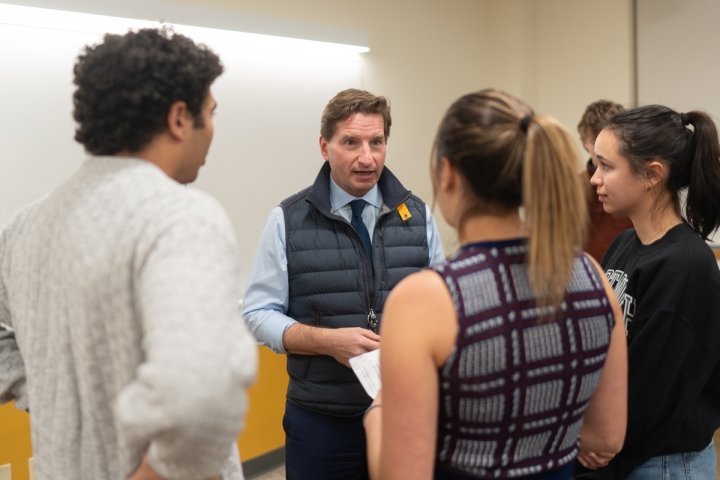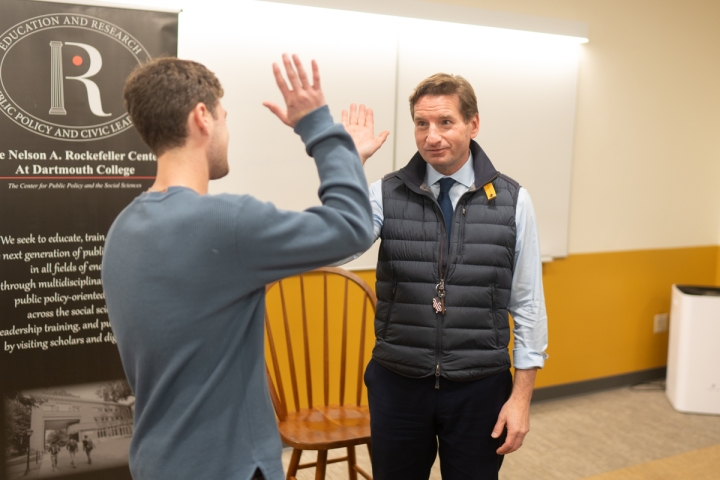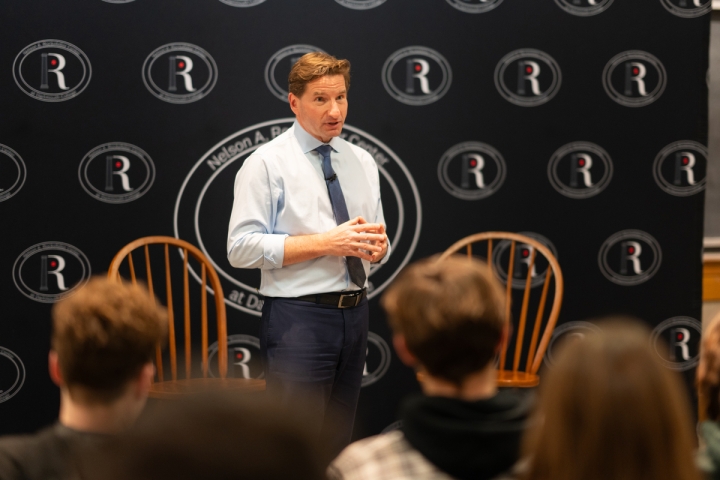Rep. Dean Phillips, D-Minn., this week compared his challenge to President Joe Biden in the New Hampshire Democratic primary to a campaign by another Minnesotan, a little-known senator who challenged an unpopular sitting president in the first-in-the-nation primary in 1968.
“Gene McCarthy recognized that President (Lyndon Baines) Johnson was terribly unpopular. There was a war that was disgusting him. He recognized that massive numbers of Americans were unheard and particularly young people,” Phillips said on Monday during a talk at Dartmouth.
Marshalling the energy of voters opposed to the Vietnam War and an army of students, and ignoring attacks from the party establishment, McCarthy came within 7 percentage points of defeating Johnson in the New Hampshire primary.
“President Johnson left the race because of that. And who entered it? Bobby Kennedy, which meant Gene McCarthy is a footnote in history. Had Bobby Kennedy not been assassinated, I do believe he would’ve won that election, and this country would be a much different place.”

Phillips was on campus as part of the Path to the Presidency series, co-hosted by the Nelson A. Rockefeller Center for Public Policy and the Dartmouth Political Union, a nonpartisan, student-run political organization dedicated to open debate from all perspectives.
The campaign stop for Phillips, who decided to jump into the race in October, attracted national media attention, including camera crews from NBC, ABC, and CNN.
Speaking to some 100 students in Filene Auditorium and another 75 watching by livestream, Phillips insisted that, unlike McCarthy’s short-lived campaign, he can take a strong showing in New Hampshire on to races in South Carolina and Michigan. He argued that Biden’s growing unpopularity and concerns about his age make it imperative that the Democratic Party put forward candidates from a new generation who are committed to restoring American faith in government and defeating Donald Trump, who he calls an existential threat to American democracy.
“I have great respect for President Biden. I believe he was the only man—the only candidate who could have beaten Donald Trump in 2020,” Phillips said.
“I also believe that he’s probably the only Democrat who could lose and probably will lose to Donald Trump in 2024. This is not a campaign of destruction against the president. To the contrary, it is a campaign to prevent the destruction of democracy.”
The candidate emphasized his commitment to working across the aisle as a leader of the bipartisan Problem Solvers Caucus and as the organizer of regular dinners with congressional colleagues on both sides of the aisle. He said he considers himself a progressive who is viewed by many as a moderate “because I’m pragmatic.”
“What makes me a moderate is that I have decent common-sense principles that I simply want to get done,” Phillips said.
“My voting record is pretty progressive, but I am pro-worker and I’m pro-business. They’re not mutually exclusive,” he said. “I’m fiscally responsible and I’m socially inclusive.”
The 54-year-old Phillips is a business owner who graduated from Brown and has an MBA from the University of Minnesota. He is in his third term in the U.S. House.
Phillips used a question on border policy from moderator Emma Wolfe, vice president for government and community relations, to criticize not only Biden’s presidency, but his long career in Washington. Biden turns 81 next week.

Calling the crisis at the border “an embarrassment to the United States,” Phillips called for tighter security coupled with more humane treatment for immigrants, while also praising the compassion of many Border Patrol agents who, he said, are trying their best to do the right thing. His plan would call for asylum-seekers to apply in their home countries, adjudicated by U.S. officials at embassies and consulates in the country of origin.
“And then best of all, if you qualify for asylum, we’ll bring you to the United States and then you’ll have your $6,000 or $7,000 in your pocket to start a new life,” he said. Asylum-seekers are now frequently forced to pay smugglers, which leaves them at risk of arriving at the border penniless and homeless.
“President Biden’s been in Washington for 50 years, been on foreign relations for many, many years, was our vice president for eight, and president for three. This is a failure of generations and administrations over his entire career in Washington.”
For the last half of the discussion, Wolfe opened the floor to questions from the audience. To a question on the Israel-Hamas war from Bea Reichman ’27, Phillips said he absolutely defends Israel’s right to self-defense, asserted that Hamas is a terrorist organization that must be eliminated, and declared his firm belief that Palestinians have a right to self-determination.
“I intend to be the first Jewish president in American history, and I intend to be the president that finally signs documents that help create a Palestinian state. Plain and simple. It’s long overdue,” he said.
Speaking after the event, Reichman said Phillips impressed her.
“I did not know who he was before today, but I think that he’s a really strong candidate and I was really impressed by his answer when I asked him about Israel and the conflict between Israel and Hamas,” said Reichman, a Middle Eastern Studies and public policy major who is also a member of Dartmouth Democrats.
She says she doesn’t share the concerns of some Democrats who see a challenge to the president as bad for the party.
“I think that it’s important that the Democratic Party has unique voices, many voices,” she said.
Reichman says she is still investigating the candidates for the Democratic primary. “I haven’t completely decided, but Dean Phillips made a very compelling argument tonight.”
Biden’s name won’t appear on the New Hampshire primary ballot because of his effort to move South Carolina, and some other states, to the front of the primary calendar, but supporters can still write him in.
Ben Schanzer ’27 is skeptical about the impact that Phillips’ campaign can have on the Democratic nomination.
“His campaign is definitely a reach, the way I see it,” Schanzer said. “I think the way the system is constructed right now, it’s nearly impossible to have a campaign get anywhere without the support of the party, especially running against the incumbent.”
But while Schanzer, a government major who is involved in local politics in his home state of Massachusetts, plans to maintain his registration in his hometown and to vote in the Massachusetts primary, he spoke to Phillips after the event about volunteering for his campaign in New Hampshire in the interest of bringing the widest range of voices into the contest.
“I think if the primary were today, I would still probably vote for Biden just because I think it would be bad to waste a vote,” he said. “But that’s not to say I don’t support Phillips’ campaign. I’d like to support it. I’m going to try to volunteer and such. And if those numbers pick up, I think he’s got a real shot, but I’m not confident he would win today.”

